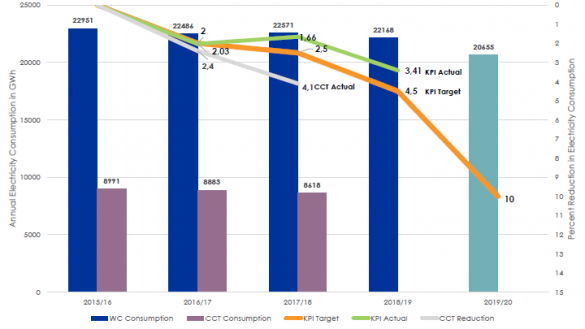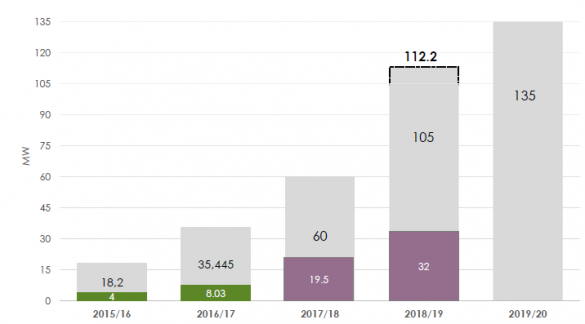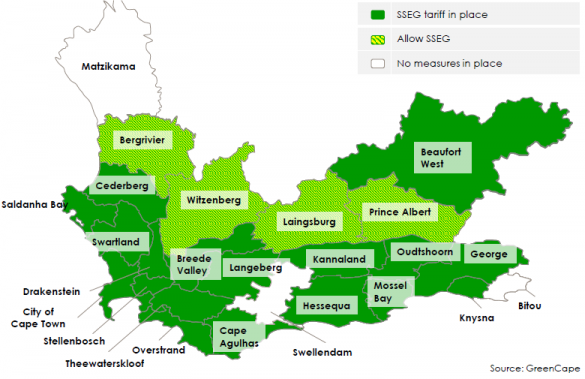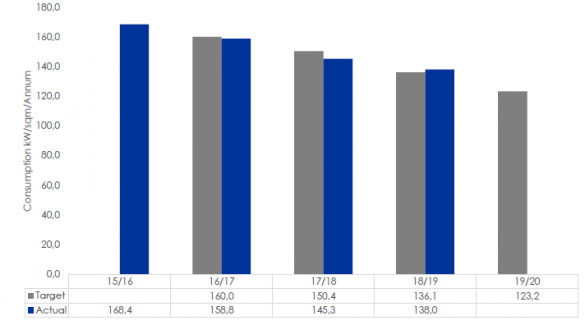Why is this important?
The load shedding of 2015 demonstrated that electricity supply disruptions have an adverse impact on people's daily lives, on economic growth as well as the Province's outlook as an investment destination.
There has been notable improvement in the general performance of the Eskom generation fleet in the recent past. Despite this, the short-term outlook for security of supply remains uncertain, and at periods of peak demand the recorded reserve margins are still significantly below the desired international standard of 15% of total demand.
This vulnerability of the country's power supply was made evident by the recent industrial action and resulted in load shedding which Eskom was forced to implement. Current energy supply capacity is also only sufficient if there is low economic growth. Even a slight uptick in the economy could result in more power outages.
South Africa relies heavily on coal as a primary source of energy, with over 90% of the current Eskom generation from coal-fired power plants. Half of the Western Cape grid is also supplied through nuclear generation.
There therefore remains an urgent need to diversify energy sources and deploy cheaper, sustainable and cleaner alternative technologies.
The focus of the Energy Security Game Changer is to diversify the energy mix in the Western Cape and ensure sufficient energy security to support economic and population growth in the province.
How are we succeeding?
Energy Security: Progress towards achieving overall KPI target - missed our 2018/19 target by 1.1%


The Game Changer has a target of 10% reduction in electricity consumed from Eskom by 2020.
Energy Security: Rooftop PV installations in the province - we have met our 2018/19 target
of 105MW


The Game Changer has a target of 135MW installation of Solar PV in the province by 2019/20. Note that were some issues with Q4 data collection 2017/18.
Energy Security: Regulatory Environment for SSEG in municipalities - have reached target
of 22 municipalities allowing SSEG and 18 with feed-in tariff.

Municipalities need to have three things in place to have the full enabling environment in place for grid-tied small scale embedded generation: a bylaw, a policy and a Nersa approved feed-in tariff.
The capacity of Solar PV installations (MVA) in Game Changer municipalities with feed-in tariffs.
Energy Security: Western Cape Department of Public Works (DTPW) Energy Savings - the department
met the 2019/20 energy savings target two years ahead of schedule.

The Western Cape Government has a target of reducing its energy consumption to 123.2 kWh/m²/per annum for metered buildings by 2019/20.
The DTPW's 17/18 consumption was 35% below the private sector average, which makes it one of the most energy efficient property
portfolio's in the country.
What are we doing?
The Western Cape Government has identified levers that will change the energy demand patterns in the province.
These are:
- Business and households becoming more energy efficient. The WCG has been running an extensive communications drive to educate citizens and businesses on how to become more energy (and water) efficient by sharing no cost, low cost and invest to save energy and water efficiency tips. The provincial government has also been setting an example by introducing energy efficiency saving measures in all its buildings including installing Rooftop Solar PV.
- Increased uptake of Rooftop Solar PV. The business case for installing rooftop solar PV continues to improve with high investment returns and short payback periods. The WCG has run an extensive communications drive to encourage businesses to install Solar PV. We have also focused on becoming the leading province in terms of a supportive regulatory environment for small-scale embedded generation (SSEG). As a result, it is now legal in 21 municipalities to connect rooftop solar PV to the electricity grid. Thirteen of these municipalities have nationally approved tariffs in place, meaning users can be compensated for feeding their surplus power back into the municipal electricity grid.
- Introduction of alternative energy sources. In order to change the energy landscape, the WCG is focused on the introduction of Liquefied Natural Gas (LNG) as a new energy source in the province. Our strategy is to promote the Western Cape as an attractive region for the landing of LNG. The introduction of LNG is the responsibility of national government. The WCG is playing an important facilitating role to support the decisions that need to be made for LNG importation, in particular through providing research and expert knowledge.
What you can do
- Households and businesses can take a number of steps to become more energy efficient. Click here to find out how you can reduce your energy consumption and save money at the same time.
- Rooftop solar PV has become a cost effective and sustainable form of electricity for businesses. All the information you need to install Rooftop Solar PV can be found here.

